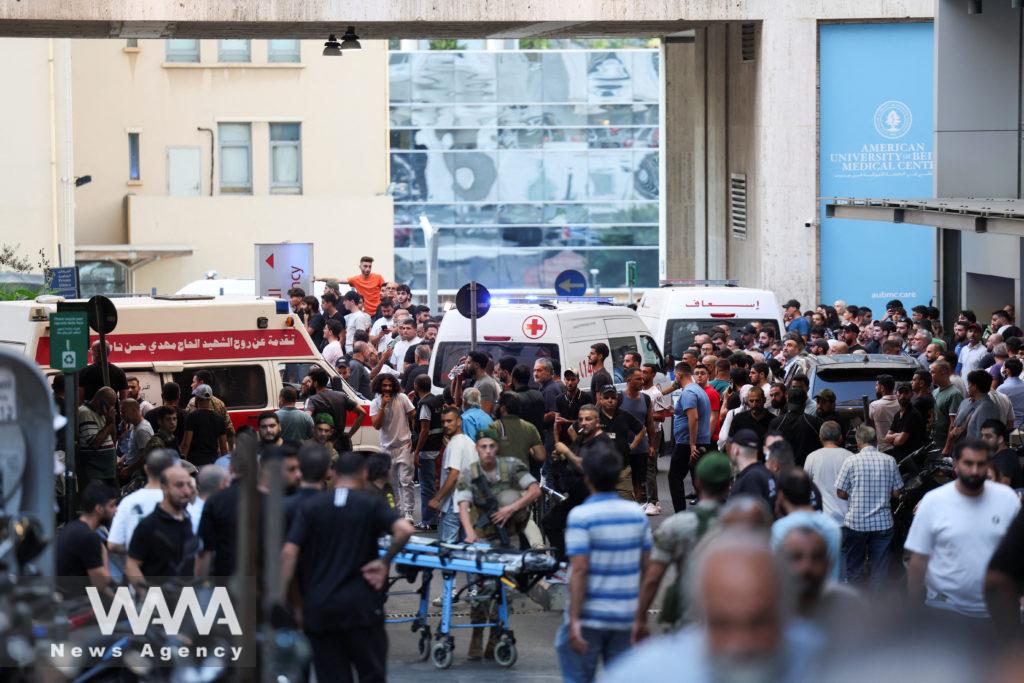On the Brink of All-Out War?!
WANA (Sep 22) – Following Israel’s operations on September 17 and 18 in Lebanon, which targeted thousands of communication devices (pagers and Icom walkie-talkies) and resulted in the martyrdom of 37 people and injuries to nearly 3,000, as well as the September 20 airstrike on the southern suburb of Beirut that killed 31, including 15 senior Hezbollah commanders and injured 68 others, the threat of an all-out war is greater than ever.
Since October 7, 2023, the entire region and the world face an unprecedented risk of escalation, fueled by Israel’s ongoing attacks, backed by the West, which flagrantly violate ethical, humanitarian, and military red lines, as well as international law.
The events of September 17 and 18 in Lebanon recall past cyberattacks by Israel and the U.S., such as the Stuxnet incident that targeted Iran’s nuclear facilities. Israel has previously launched smaller-scale attacks across the region, targeting military, political, and cultural figures, but the recent strikes, which affected thousands, are unprecedented.

From Infected Blankets of Native Americans to Infected Pagers in Lebanon!
WANA (Sep 20) – There is a well-known event in the history of science that took place in 1736 AD, after the discovery of the Americas. European and Spanish settlers, in an effort to conquer new lands, waged a major war against the indigenous Native Americans. Despite numerous battles and much bloodshed, the settlers were […]
Israel, notorious for instilling fear among civilians under the pretext of self-defense, once again demonstrated how technology, a symbol of human progress, can be weaponized as a dangerous tool of war, risking countless lives. The international community’s silence only paves the way for such tactics to become more commonplace, threatening future misuse of civilian technologies in warfare.
For decades, Israel has used various means—car bombs, letter bombs, mobile tracking, and targeted assassinations—to eliminate opponents in neighboring countries like Lebanon, imposing its political and security agenda. Lebanon, due to its demographic, geographic, and political significance and its role as a hub for Palestinian resistance, has long been the target of Israeli military and terrorist operations, even before Hezbollah’s establishment.
The September 17-18 sabotage of communication networks and the subsequent airstrikes are part of Israel’s broader strategy to provoke Hezbollah, aiming to draw it into a full-scale war, push it behind the Litani River, and reclaim parts of the border area, reminiscent of the 1982 invasion that expelled the PLO from Lebanon.

Ambulances arrive to American University of Beirut Medical Center (AUBMC) as more than 1,000 people, including Hezbollah fighters and medics, were wounded when the pagers they use to communicate exploded across Lebanon, according to a security source, in Beirut, Lebanon 17 September 2024
Israel’s attacks on Lebanon’s communication networks came just hours after the Israeli government announced its intention to “add the return of northern residents to their homes” as a war objective.
In this context, Israeli Defense Minister Yoav Gallant informed U.S. envoy Amos Hochstein that “the only way to guarantee the return of northern residents is through military action.” These explosions coincided with the redeployment of Israeli forces from Gaza to the northern front, signaling a major escalation.
Israel’s three operations pursued several key goals:
A. Countering Netanyahu’s Failures: As the anniversary of Operation Al-Aqsa Flood approaches, and with Israel failing to destroy Hamas, assassinate Yahya Sinwar, or free Israeli prisoners, the pressure on Netanyahu from the families of captives and displaced settlers has intensified. To quell internal dissent and salvage his public image, Netanyahu sought to shift focus by targeting Hezbollah, a major backer of Gaza’s resistance.
B. Stopping Hezbollah’s Support for Gaza: Another goal was to deter Hezbollah from supporting Hamas and the resistance in Gaza and the West Bank. Despite Israel’s efforts, Hezbollah, under the leadership of Hassan Nasrallah, reaffirmed its commitment to supporting the Palestinian cause, stating that the group will not stop backing Gaza, regardless of the consequences.

Details Behind the Pager Explosions in Lebanon
WANA (Sep 19) – The hacker group “Hanzala” claims to have obtained highly confidential information through recent large-scale cyberattacks. They announced plans to release all related documents in the coming hours. The attack was reportedly carried out by contaminating pager batteries with a heat-sensitive explosive material during the supply chain process in the manufacturing […]
C. Restoring Northern Settlements: One of Israel’s strategic aims is to return displaced settlers to the north. Over the past year, due to Hezbollah’s activities, tens of thousands of settlers were forced to flee, creating a significant financial burden for Israel and sparking widespread anger among the displaced.
D. Imposing Heavy Costs on Hezbollah: The September attacks aimed to cripple Hezbollah’s communication systems, disrupting its command and control capabilities. Although the targeted devices were reportedly not part of Hezbollah’s military framework, the subsequent airstrike on southern Beirut sought to deal a blow to Hezbollah’s military leadership, killing senior commanders and exposing Israel’s infiltration of the group.
E. Psychological and Media Warfare: Beyond its operational objectives, Israel’s actions aimed to project Hezbollah’s vulnerability, instill fear in Lebanon, and pressure Hezbollah’s leadership to reconsider its stance. Israel also sought to demonstrate its technological superiority and military prowess to boost domestic morale and reassure the Israeli public.

Israel’s Terrorist Attack on Hezbollah in Lebanon
WANA (Sep 17) – Reports indicate simultaneous explosions in Hezbollah’s communication devices, including pagers, mobile phones, and radios, in areas of southern Lebanon, the southern suburbs of Beirut, and eastern Lebanon. These explosions have so far resulted in over 2,750 injuries and eight deaths, including a child, and the toll is still rising. International […]
Despite these efforts, Hezbollah continues to maintain its presence along the northern borders, preventing the return of thousands of settlers. Israel’s technological and terrorist operations have not restored deterrence in its favor, leaving the region on the edge of further conflict.












